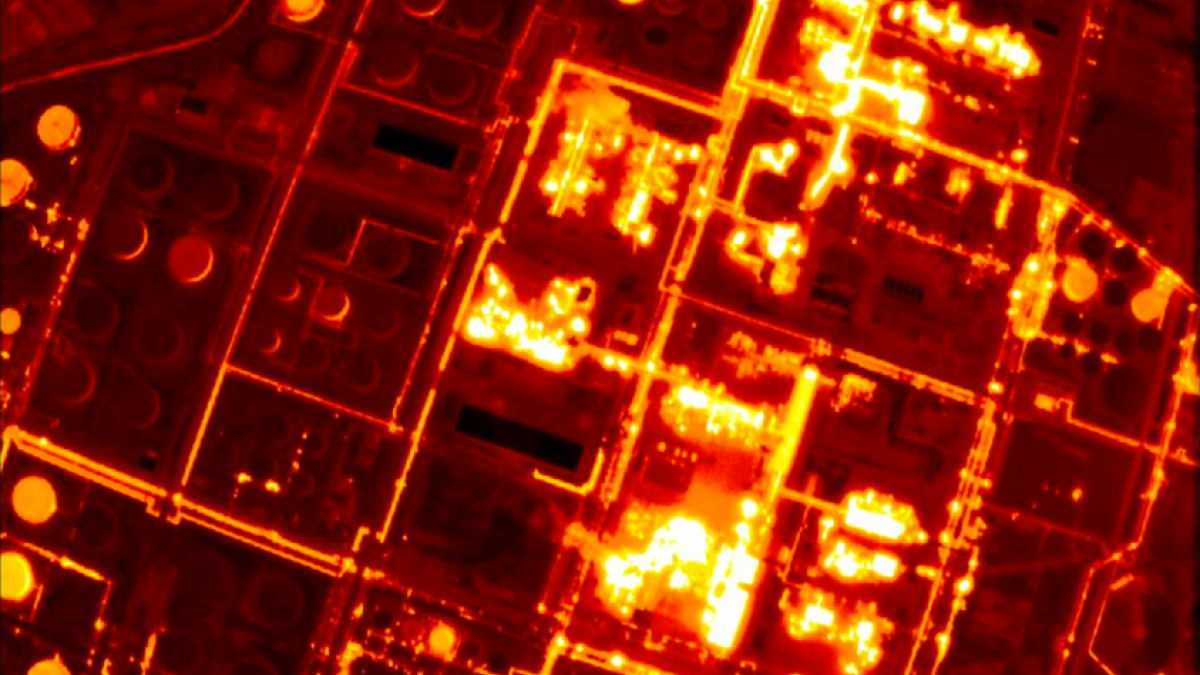Surrey SPRINT partner – Satellite Vu – raises £3.6m to launch the world’s first thermal imaging satellite constellation in 2022
A research collaboration with Surrey Space Centre has helped Satellite Vu, a specialist in Earth observation technology and services, to demonstrate the potential of infrared satellite sensing technology to address global challenges such as climate change and maritime security.

The infrared camera can take images which show heat loss from residential houses compared to typical optical photographs.
The SPRINT (SPace Research and Innovation Network) project with Surrey Space Centre focused on using infrared satellite data for thermal measurement of maritime applications. The project team flew a mid-wave infrared (MWIR) camera on an aeroplane to collect data from around the Solent and surrounding maritime areas, simulating the data that would be captured from a space-based sensor. The University of Surrey provided Satellite Vu with advanced analysis techniques to process and validate the imagery to show the technique’s potential for commercial maritime applications and demonstrate its advantages over SAR (synthetic-aperture radar) data in some scenarios.
Following a series of similar proof of concept flights, Satellite Vu has now raised £3.6m in seed funding, led by Seraphim Capital, to launch the world’s first satellite constellation, which will be capable of imaging the thermal footprint of any building on earth every one-to-two hours.
Due to launch in 2022, the satellite will allow governments and organisations to make informed decisions about which buildings need to be upgraded to improve their thermal efficiency. The built environment is responsible for almost 40 per cent of global carbon emissions, so this capability will be crucial in the fight against climate change.

An infrared image showing flows in pipelines at Stanlow Refinery, Liverpool, demonstrates how an infrared image can detect previously unseen economic activity.
Anthony Baker, CEO of Satellite Vu and a Surrey alumnus, said: “Collaborating with the University of Surrey for the SPRINT project was a natural choice because of its expertise in remote sensing applications as well as its proximity and reputation. The SPRINT project was the first grant we won and helped us both in a technical sense and also in sending out positive signals to the venture capital world.
“We learned a lot from our four preliminary flight campaigns (including the SPRINT project with Surrey and the others with Surrey Satellite Technology Limited) in terms of testing and improving the design of the infrared camera – which is obviously a lot quicker and easier to achieve with an airborne satellite rather than a space-based one.”
Research from the SPRINT project, which was led by Dr Raffaella Guida, has now been published in the paper ‘Comparison of High-Resolution Spaceborne MWIR Data with SAR and AIS for Ship Detection using Synthetic Data’ which will be presented by Mr Max Rodger, RA on the SPRINT project, at the IEEE International Geoscience and Remote Sensing Symposium in Brussel in July 2022.
Dr Guida said: “The University of Surrey was already known worldwide for its excellent research and strategic industrial partnership in the area of SAR applied to maritime surveillance. The SPRINT project gave us a significant opportunity to extend our investigations on maritime applications to the thermal range of frequencies and start a new collaboration with forerunners in the field like Satellite VU.”
SPRINT is a national business support programme which provides access to expertise and facilities at UK universities in the space remit, in order to help businesses accelerate the development and of their products and services through the commercial exploitation of space data and technologies.
Discover our courses in electrical and electronic engineering, including our BEng (Hons)/MEng Electronic Engineering with Space Systems, MSc Space Engineering and PhD in Space Engineering.

